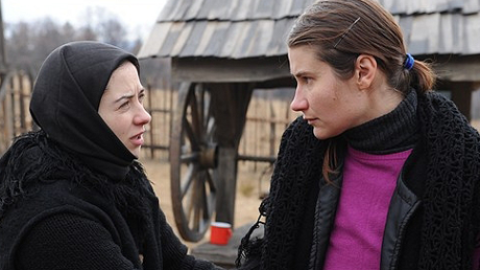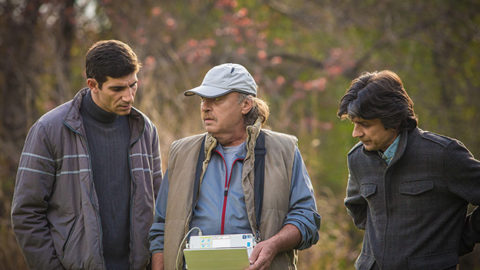
Beyond the Hills
At 44, Cristian Mungiu rides the crest of the Romanian New Wave, having won the Palme d’Or at Cannes in 2007 with his second film, 4 Months, 3 Weeks and 2 Days. Romania’s cinematic Renaissance took about a decade to kick in after the fall of the Iron Curtain and Nicolae Ceausescu, with classic storytelling, composition, color, sound, and characters. Mungiu’s contemporaries (Radu Muntean, Corneliu Porumboiu, Cristi Puiu) may shade their terrain a bit more freely with comic brushstrokes, but this generation of directors seem to have mostly modern roots, in Czech film and the New German Cinema. In his fourth feature, Beyond the Hills, set in a convent outside his hometown of Iasi, Mungiu culls from the Scandinavians, the great Dane, Carl Theodor Dreyer, and Ingmar Bergman.
Like Dreyer, Mungiu began his career as a journalist, because film school under Ceausescu was reserved for the children of the party elite. The son of teachers—his father a professor of pharmacology, his mother one of Romanian—Mungiu studied English literature at Iasi University and drifted toward storytelling, a far more uncertain occupation in a country where doctors always ate. His parents worried; now, not so much.
Mungiu’s characters, in microcosm, live through the end of eras not only in terms of regimes but also thought and belief. In Beyond the Hills, one senses it isn’t simply that the Romanian Orthodox Church has failed but that religion itself is collapsing under its own anachronistic weight. When the priest in charge of the venerable convent in that film inadvertently “crucifies” a young woman he doesn’t wish to save so much as make disappear, it ensured that the film’s two female stars, Cosmina Stratan and Cristina Flutur, would share the Cannes Palme d’Or for Best Actress, and that Mungiu would win the Best Screenplay prize.
As with his Romanian New Wave peers, Cannes brought Mungiu to the world stage, starting with Occident in 2002, then the miraculous revelation of 4 Months in 2007, followed by the ironic omnibus film Tales from the Golden Age in 2009 (for which he wrote the screenplay and directed an episode). Mungiu, however, is canny about what Cannes has meant to Romanian filmmakers, and what it has not.
Set the scene for us in terms of Romanian artists during the post-WWII period.
In 1947, Communism entered the country in a very brutal way. Our king was forced to leave, and art counted for very little. By the Fifties art was propaganda. When Ceausescu came to power in 1965, we began to have more of a national culture and less of an international socialist culture. This allowed some artists to begin to express things other than the Communist line. Ceausescu’s greatest moment was in 1968 when he gave a speech against the Soviets. After that, he was treated like a hero. Then in 1972 Ceausescu visited Asia, after which he instituted new ideas about culture.
Censorship became very present. Government commissions analyzed every book, every film, every painting. This censorship grew worse into the Eighties. There were two options for artists: either to find a way to leave the country or stay and look for a way to resist. It was easy to resist through poetry. It was much more complicated for literature and film. Literature and film were censored the most.
At the end of the Eighties, I was working as a journalist. We were given a list of graphic signs that could not be included in photos. Nothing sharp or pointy. Once I photographed an ear of corn. There were some kernels missing. Censorship rejected the photo. It was interpretable: why were the kernels missing?
In 1989 the regime changed and people discovered that they were very free. The first 10 years of this new freedom didn’t trigger a strong cinema. Freedom didn’t translate into understanding the means of expressing yourself. At first, people needed to get even in everything, in literature, in poetry, in films. They needed to speak, but that was not really art.
To what degree do you think film artists— directors, writers, actors—serve as unconscious antennae or act as conscious interpreters of the social problem at hand?
I aim to tell a story about important values by allowing the story to express itself and not impose my own interpretation. My responsibility is to present the situation and [let] the audience interpret it. I don’t think cinema should pre-interpret things for people. It is important that the story triggers the audience’s desire to meditate upon values and on their own position on the situation I have presented. Ideally, this is what cinema should be about. It should be an opportunity for people to examine values that they’ve held for a long while without really thinking about them.
In both 4 Months, 3 Weeks and 2 Days, which is set in 1987, and Beyond the Hills, which is contemporary but in some ways more timeless, you present eras that are collapsing: one governmental, the other religious.
I begin with stories that show the relationship between characters and their personal conflict that also have a profound and important background and that speak about the world. We didn’t know in 1987 that the world was on the verge of collapse. None of the characters in 4 Months know that this world is about to end. In Beyond the Hills, the film makes distinctions between the church as an institution and religion, personal faith and superstition. All of these things coexist clearly in religious people’s minds. My film asks questions: with what do you replace Christian values in the modern society? What’s the benefit of all this Christian education? [During] 50 years of Communism and moral decay, religion could have been a solution. The complete lack of social empathy continues.
People project what they want to see. This film says that we have arrived at the end of the religious era.
It is important that the actors and I simply convey the story. That’s our responsibility as filmmakers. Each scene needs to be believable, to be logical. And we need to respect the point of view of each character in the film, no matter what he or she does. Our first obligation is . . . to be honest with the story. But film is like a mirror. People project their own values onto what they see.
It happened a lot with 4 Months on abortion. Beyond the Hills is also very complex. It doesn’t allow you to say precisely and clearly “These people are guilty.” Everybody is guilty to a degree. And not only the people you see in the film. There are people you don’t see who are guilty. These girls were abandoned by their parents. We have to consider the society in which they lived, the poverty, the education caused by the poverty and 50 years of propaganda that led people to do what? They switched from a state of propaganda to a state of religion. Now we are free! Good! But the idea was not to use freedom to replace one kind of propaganda with another but to finally use your free will and make your own choices. How does a Romanian audience understand the film differently than a foreign audience? Romanians understand cinema as entertainment. A film like this is very difficult. It’s not so much a matter of education as they lack the habit and the means of assimilating easily this kind of film language. It is more difficult for them than for a spectator coming from a country where there are alternatives to watch.
How do you fund your films?
The National Center for Cinematography reviews your screenplay. If they like it, they will give you some money, but it’s very limited now. This was an expensive film so we needed outside money and set up my first co-production. My partners found some money mostly from French TV and from a German fund. Is the funders’ point of view as to what they want to accomplish with film the same as the artist’s? They don’t have a point of view. For years we insisted that we needed to have a cinema policy. People speak about this New Romanian Wave, but we missed the moment to set a production standard when we got the Palme d’Or in 2007. After that, we didn’t revisit the system, and now it is increasingly difficult to get funding. We get about 25 percent of the available funding. All the other funding is used on films that are not watchable.
The government doesn’t have a policy regarding distribution, either. We lost all the theaters. There is a private initiative with foreign investors creating multiplexes, but the language of the films in multiplexes is completely different. We don’t have someone who is organized, visionary, cultivated, with an understanding of cinema driving this process. The film commission understood that we are popular and appreciated abroad. We owe this completely to the foreign press and to the Cannes Film Festival. The moment we lose this foreign interest will be the end of this generation of filmmakers. There is no real understanding and respect for us back home. At home the general opinion is that somehow we fooled the whole world aside from Romanians.








